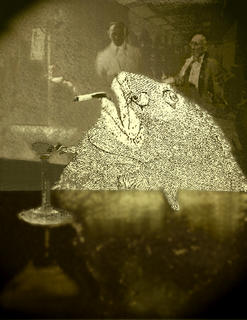MEMOIRS OF THE UNREALISTIC CHAPTER 3

Back in the '030s, Grampa wrote in his journal about seeing caricatures of friends of his in the New Yorker magazine. There wasn't an article about these friends, just a calendar listing. But these friends of his, Mr. Quintron and Miss Pussycat, were not merely listed. Their listing was punctuated with a cartoon drawing of them, beneath which ran the caption: "Mr. Quintron, inventor of the Drum Buddy, and Miss Pussycat, at the Mercury Lounge, Friday at 9pm." The cartoon showed Mr. Quintron and Miss Pussycat performing, Quintron at his vintage Hammond organ, Pussycat standing nearby in a sequin leotard, tutu and fishnet stockings, holding up a hand puppet. The hand puppet looked to be a plush donkey recently recovered from severe burns. The Drum Buddy, a drum-sound-producing machine topped by a rotating lampshade with star-shaped holes in it, was also pictured in the cartoon.
Grampa wrote, "I'm happy for them, and proud to know them. But at the same time I'm envious. I've always wanted to see myself caricatured. And not by one of those charcoal-wielding hacks on the boardwalk who draw you with oversized head and tiny body, participating in your favorite interest. I want someone to distort my features out of cleverness, not in obeisance to some arbitrary formalism. For my needs, as a matter of fact, the style of the drawing of Quintron and Pussycat is too straightforward. I want something splattery and warped. I want to see exactly which features of mine a perverse artist believes make me look like me. Bulging forehead? Squinty but penetrating blue eyes? Pointy nose? Pouty lip? Weak chin? Jowls? Veiny temples? I wouldn't take offense, regardless of how ludicrously I were rendered, or what unattractive attribute the artist chose to amplify. I would be fascinated. I would stare at it for hours, wondering at the mysteries of identity.
"Because I am sick of exploring those mysteries in my mirror, and in the disarray of the squalor in which I live. I want to see a trivial item that seeks to represent me. I want to stare at that item, seeking the mystery of myself, the mystery of what others see as me, and the mystery of emptiness in the representation of life. Because one cannot view one's own corpse. And maybe that's what I really want, to see my own corpse. Or to be at my own funeral, to see who shows up. But only fame affords one that kind of luxury. Fame enough to have a great caricaturist caricature one -- what an honor that would be! You know you've really made it when you're caricatured for an article in the New Yorker. (And not just cartooned for the calendar -- not to take anything away from Quintron and Pussycat.) To be sold in a blister pack as an action figure would be an even greater honor. A springy bobble-head less so. But, ah, to be a gashapon key fob! A super-deformed mini-fig in the Japanese kaiju style, side-by-side with the likes of Rodan, Mecha-Ghidora, and the great Godzilla."
Flicky and I often reminisce about the night we met at the Snerd. I'm not the type to be star-struck, and I think he sensed that right away. (As I hope I've made clear, unlike Grampa, I don't differentiate between Fame and any other condition of life. To me they are simply points on a continuum between infinite solitude and infinite public exposure.) Flicky appreciated not being fawned over, and he jumped at the chance to have a normal discussion. We ended up going out for drinks at Musso and Frank's. I'm a fan of their respect for the genuine martini, and Flicky loves the oversized booths, upholstered with cracked red leather and brass brads, designs from a bygone age of gentlemanly smoking rooms, while actual elderly gentlemen rollerskate here and there in short white jackets, delivering drinks and rare meat. Here we had the first of many nights of alcohol, steak, and aesthetic discourse. The subject at hand was, of course, "WOO-MO-MANIA" and its strengths and weaknesses. We agreed the event had offered rarities worth seeing at least once, but that the only satisfying piece was "All the Puppets Know Pinocchio." We both loved it. The focus of our discussion tightened around Minelli-Zappa-Woo's aesthetic strategies. During our intense volley of analytical insights, Flicky made a very perceptive remark about her choice of the ninth dimension as the depth axis for Pinocchio's midlife crisis. It's a comment that invariably returns to mind whenever the subject of gravity as an artistic medium comes up in conversation.
"You know the way a minor chord in music conveys sadness?" He was smoking a cigarette and nursing a whisky on ice, "Or a major seventh at the end of a blues melody turns one back towards the beginning with the gallows humor of the chronically unfortunate?" I nodded. It was the hour when drunk, meat-fed philosophers unveil their finest truths. That's the time to nod when a famous fish draws you in with quiet sibilance. "Well, the ninth dimension," he said, his eyes -- the two of them crowded together on one side of his face -- clouding over with a mist of reverie, his mouth off to the other side of his head, lower jaw slack, fish lips, like Belmondo's in Goddard's Breathless, setting a curl of smoke adrift:
"The ninth dimension, in a pocket setting by the sea," he said, at such an hour, "is the dimension of regret."


0 Comments:
إرسال تعليق
<< Home